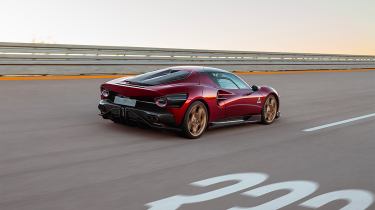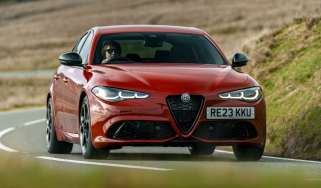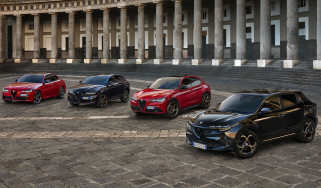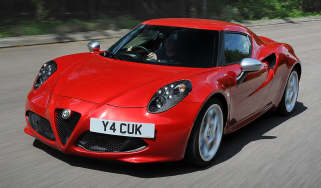Alfa Romeo 33 Stradale achieves 207mph top speed target
The 33 Stradale features a twin-turbocharged V6 or pure-electric power
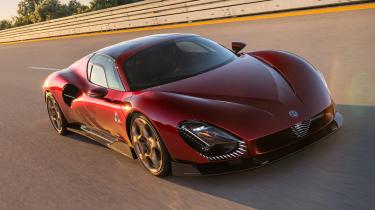
There’s a new Italian supercar in town and it’s called the Alfa Romeo 33 Stradale. We’ve already seen it in the metal at the Goodwood Festival of Speed, but now the performance figures of Alfa’s halo car are being tested – and we can see the 33 Stradale has reached its expected 207mph top speed.
As the car’s name suggests, it’s a tribute to the 33 Stradale built by Alfa between 1967 and 1969, but with modern power, courtesy of a choice between pure-petrol and all-electric versions.
Film of the top speed run at the Nardo testing facility in Italy has been released by Alfa Romeo - and the company allowed us to hear the 33 Stradale’s V6 soundtrack, too. The car is also undergoing dynamic testing at Alfa’s Balocco circuit ahead of first deliveries in December.
One of those deliveries will be to Formula One driver Valterri Bottas, who helped develop the car. He’ll be one of 33 individuals to own a 33 Stradale, each with a price tag in the region of £2.8m. All have been sold and we’ve been told no two models will be to the same specification. Alfa Romeo even said no to customers wanting to purchase both the pure-electric and the internal combustion-engined 33 Stradale. While the company hasn’t revealed the split in sales figures between the two powertrains, we know there will be more petrol-powered 33 Stradales built than electric versions.
Former Cupra design boss and now Alfa Romeo’s Head of Design, Alejandro Mesonero-Romanos, spoke to Auto Express about the importance of the 33 Stradale as a halo car for the brand. “It’s something that needed to be done. The last very important supercar for Alfa Romeo was the 8C. The customers were ready and waiting and there was an expectation.”
It’s clear the design of the new 33 Stradale has been influenced by its sixties namesake. There are rounded headlights, a low grille opening with a small and modern interpretation of Alfa Romeo’s Scudetto shield, and a clamshell bonnet that opens just like the original’s. The butterfly doors with overhanging glass are also a throwback, as is the clamshell cover for the rear-mounted engine. There are also circular tail-lights and a black piece of trim that mimics the meshed venting of the old car, while 20-inch alloy wheels, finished in black, gold or silver, fill the arches.
The cabin is like no other Alfa Romeo’s. The approach is fairly minimalistic, with a small touchscreen located low on the dash for a more driver-focused layout. Even the steering wheel is devoid of any buttons so the driver isn’t distracted, and the instruments are quite conventional, with a screen displaying two dedicated dials for the tachometer and speedometer.
The touchscreen can slide up into the dash and out of sight - something Mesonero-Romanos particularly wanted. “Most drivers will only use the touchscreen for navigation. On roads you know, you don’t want a cluttered interior so that is why we have added the functionality of removing the screen from sight.”
A wraparound windscreen along with the segmented side windows certainly give the 33 Stradale the feel of a sixties racer from the driver’s seat. The front wheelarches are clearly visible too, which Mesonero-Romanos claims will help drivers place the car on the road.
The interior is “20 per cent away from the finished result in terms of quality”, according to Mesonero-Romanos. When we saw the car earlier this year, the materials all felt of a premium quality with robust switches and aluminium throughout. However, some wobbly leather trim and Tonale indicator stalks (we’re told the real things will be made from carbon fibre) betrayed the fact that this is only a show car at this stage. There is a rear window, but Alfa Romeo has added a digital rear-view mirror to help improve visibility, using a camera mounted just above the engine cover.
Overhead, there are a few toggle switches inspired by an aeroplane’s cockpit, and the centre console houses the gear selector and aluminium switches for the various driving modes. These include Strada (Road), which is the softest setting, and Pista (Track), which ensures the powertrain is at peak output and responsiveness. Elsewhere there’s a switch to operate the hydraulic nose lift, which can raise the front by 50mm at speeds below 25mph.
Two interior designs are offered with the 33 Stradale. Tributo uses leather and aluminium, while Alfa Corse replaces that with Alcantara and carbon fibre. The bucket seats are designed to combine comfort with ergonomics and in a nod to the minimalist cabin design, there are no door handles, just a leather strap. The ‘glovebox’ takes the form of a removable bag, which can be specified in different materials and colours.
While Alfa Romeo hasn’t specifically said the 33 Stradale uses the same platform as the MC20 from Stellantis stablemate Maserati, it seems likely, with the Alfa Romeo using a 3.0-litre V6 twin-turbocharged engine similar to the MC20’s Nettuno unit.
Alfa Romeo says the 33 Stradale develops more than 620bhp with the V6, but there’s also a pure-electric configuration with over 750bhp. The company claims a maximum range of 280 miles for the EV, which is still under development. We expect it will use a 102kWh battery, but Alfa hasn’t revealed if the car will have dual or a tri-motor set-up.
As for the V6, there’s a claimed top speed of 207mph and a 0-62mph time of under three seconds. Given the differences in weight between the two powertrains, we expect Alfa Romeo will have bespoke settings for the two cars’ chassis, which feature a double-arm suspension with active shock absorbers and carbon-ceramic brakes.
Mated to the V6 engine version is an eight-speed dual-clutch automatic transmission, sending power to the rear wheels through an electronic differential. The body of the 33 Stradale is formed from an aluminium H-frame and a carbon-fibre monocoque for rigidity and lightness.
Click here for our list of the best supercars on sale right now...
Find a car with the experts


